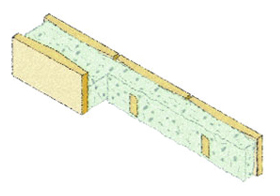Recycled Content
To avoid the environmental consequences of extracting and processing virgin materials by using recycled and reclaimed materials.
- Most products available with recycled content
- Grout in concrete masonry can contain substantial percentage of SCM
- Grout is hidden, no effect on aesthetics
| CalGreen | A5.405.4 (except structural frame) |
| CHPS | MW C3.1.2: 1 to 2 pts. |
| GGlobes | 5.4.1.1: up to 10 pts. |
| SITES | SD-MS 5.5 Use recycled content materials: 3-4 pts. |
| BDCv4 | MR BPDO - Sourcing of raw materials Op 2: up to 2 pts. |
| BDCv4.1 | MR BPDO - Sourcing of Raw Materials: up to 2 pts. |
| NDCv4 | GIB Recycled and reused infrastructure: 1 pt. |
| CommP&D | Responsible Sourcing: up to 2 pts. |
| Applicable Products / Systems |
|
 Concrete unit masonry includes low impact CarbonKind CMU by Angelus Block. Learn more here.
Concrete unit masonry includes low impact CarbonKind CMU by Angelus Block. Learn more here.
Unit-level:Angelus Block offers CMU, pavers, and SRW units with postconsumer / preconsumer recycled content blends (crushed reclaimed and waste product as aggregate replacement). Many stock items contain recycled material.¹ The result is a corresponding reduction in consumption of virgin aggregates.
System-level - concrete masonry:Masonry grout is approximately 50% or more of the volume of solid grouted concrete masonry, and has substantially greater potential sustainability benefit than recycled content in CMU alone. Supplemental cementitious materials (SCM) like fly ash, or fly ash combined with ground granulated blast furnace slag (GGBFS), may be used as a partial Portland cement replacement, and as a practical means of introducing significant recycled content into the masonry wall without adversely affecting aesthetic control of exposed masonry units.
The Concrete Masonry Association of California and Nevada recently conducted studies to demonstrate the effects of fly ash in masonry grout. Tests were conducted on mix designs with fly ash and fly ash/GGBFS as replacement of cement. Results indicated:
- Grouts with up to 30% by weight of Portland cement replaced with Class F fly ash can be treated as conventional masonry grout.
- Grouts with 40% to 50% by weight of Portland cement replaced with Class F fly ash are viable; compressive strength should be tested at 42 days, and should not have a significant effect on the overall project schedule.
- Grouts with 50% to 80% by weight of Portland cement replaced by fly ash (25%) and GGBFS (varying %) are also viable.
- These grouts have other benefits, such as increased workability.

Availability and specific mix designs will vary by local grout suppliers, who should be consulted for specifications. Please contact the Concrete Masonry Association of California and Nevada (CMACN), www.cmacn.org, or your Angelus Block representative for more information.
¹ Please confer with your representative for current availability, content, and locations. Availability, percentages, and type of recycled content are subject to change. Recycled aggregates are inherently variable; the higher the recycled content, the greater the potential for color and texture variation. Please contact us to discuss your needs.
 Environmental Product Declarations
Environmental Product Declarations

